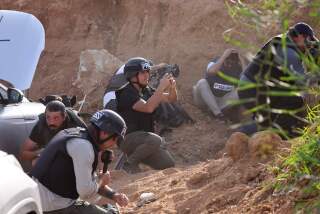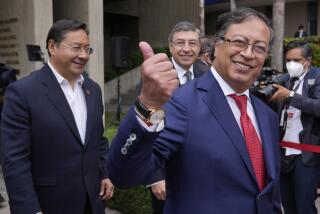Bosnian Serbs Battle Each Other for a TV Transmitter
- Share via
DUGE NJIVE, Bosnia-Herzegovina — A crowd loyal to embattled Bosnian Serb President Biljana Plavsic seized a crucial television transmitter on a remote hilltop Wednesday but was driven out by police answering to war crimes suspect Radovan Karadzic.
As Plavsic struggles to wrest power from her hard-line rivals, control of the airwaves is essential. In a country where broadcast propaganda started and sustained 3 1/2 years of war, whoever holds state media holds nearly unbreakable authority.
Plavsic’s people have occupied one of five transmitters in the Bosnian Serb half of the country, a facility they claim reaches about 50% of the Serbian population. That transmitter is located near Plavsic’s headquarters city, Banja Luka, where since Sunday journalists loyal to her have been broadcasting their own newscasts in place of the usual Karadzic-controlled transmission.
On Wednesday, they moved to take another. The tense and, at times, violent showdown over the transmission tower here, near the north-central city of Doboj, was apparently the first exchange of hostile gunfire by Bosnian Serbs in a deepening crisis that is steadily splitting Republika Srpska, the Serbian portion of Bosnia-Herzegovina.
It also marked a foray by Plavsic’s supporters into territory where Karadzic’s forces appear to remain firmly in charge.
Led by Milovan Stankovic, a former army officer and the owner of a Doboj newspaper, about 30 men and women seized the transmitter and disarmed 11 police officers stationed at the installation to protect it. Stankovic said several of the officers were sympathetic to their cause, easing the takeover.
Technicians immediately switched the frequencies so that the Banja Luka signal was beamed into thousands of homes in the Doboj area, preempting the signal from Karadzic’s stronghold of Pale.
Armed men described by Stankovic as members of a pro-Karadzic paramilitary squad known as “The Black Arm” soon arrived and opened fire over the heads of the civilians, Stankovic said. They also beat up the chief technician. But outnumbered and seeing that some of the civilians also had guns, they retreated, Stankovic said.
Several hours later, Stankovic’s group lounged under a wild pear tree alongside the transmitter and toasted its victory with cognac. “People are just fed up,” said Vujo Blagojevic, a police criminologist who said he was fired last year when he refused to join Karadzic’s ruling political party.
“We just want a normal life,” said Dragoljub Radulovic, a social worker. “We want an end to the fear and use of force . . . and the isolation of our people.”
Two U.S. helicopter gunships from the NATO-led peacekeeping force in Bosnia circled overhead, but no troops appeared on the ground. An unarmed team of United Nations police monitors was in the area, which is part of the U.S.-controlled sector of Bosnia, but also kept its distance.
Suddenly, Bosnian Serb police with megaphones began shouting from the bottom of the hill. Reinforcements had arrived and were surrounding the group.
Tense negotiations followed. This time, Stankovic’s people were outnumbered. They surrendered the transmitter and retreated to a nearby church.
Several dozen police officers loyal to Karadzic, many with their pistols cocked, then emerged from the forests ringing the hill, accompanied by plainclothesmen--apparently secret police--armed with guns, hand-held radios and baseball bats.
Two of the police officers were carrying automatic rifles, which are banned under the December 1995 peace accords that ended Bosnia’s war.
Even some of the police were disheartened to see Serb pitted against Serb. One turned to his comrade, shaking his head: “Brother, our whole fight [in the war] was useless. Look at this. It’s all falling apart.”
The lack of North Atlantic Treaty Organization intervention in the transmitter incident may reflect a new reticence to become too involved in an internecine power struggle. Plavsic has received strong support from the West despite her own warmongering past because she is seen as cooperative in executing the peace accords.
At the church where his group had retreated, Stankovic was circumspect. Although defeated, he said, his side had made its point.
“The war started in the heads of people, and it must be broken in the heads of people,” he said. “That can only happen if electronic and print media are independent.”
Back at the transmitter, a shout of euphoria went up. Karadzic’s men had reconfigured the frequencies, and Pale television was again on the air.
More to Read
Sign up for Essential California
The most important California stories and recommendations in your inbox every morning.
You may occasionally receive promotional content from the Los Angeles Times.










